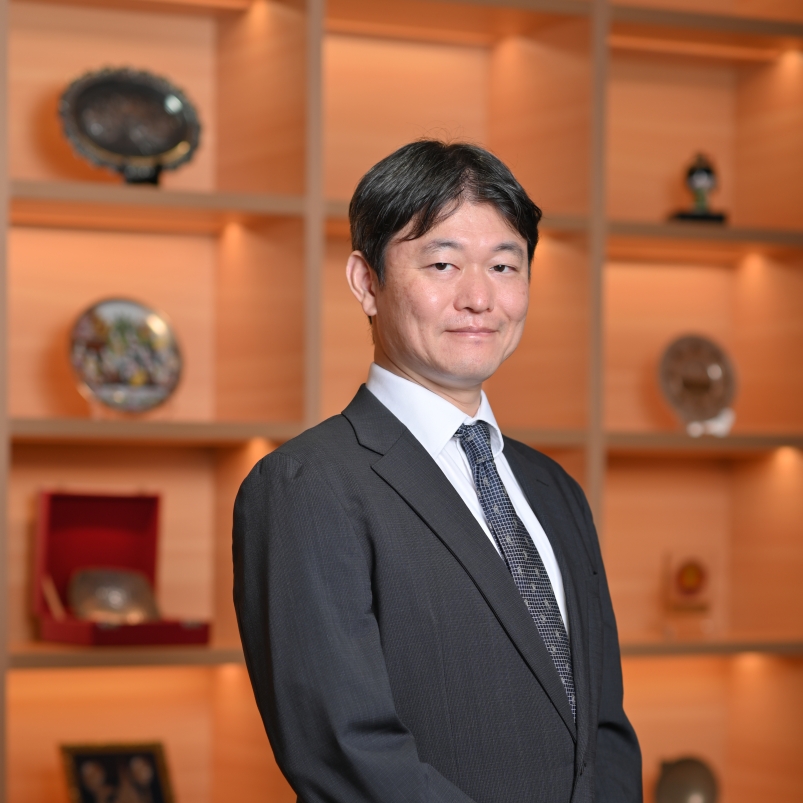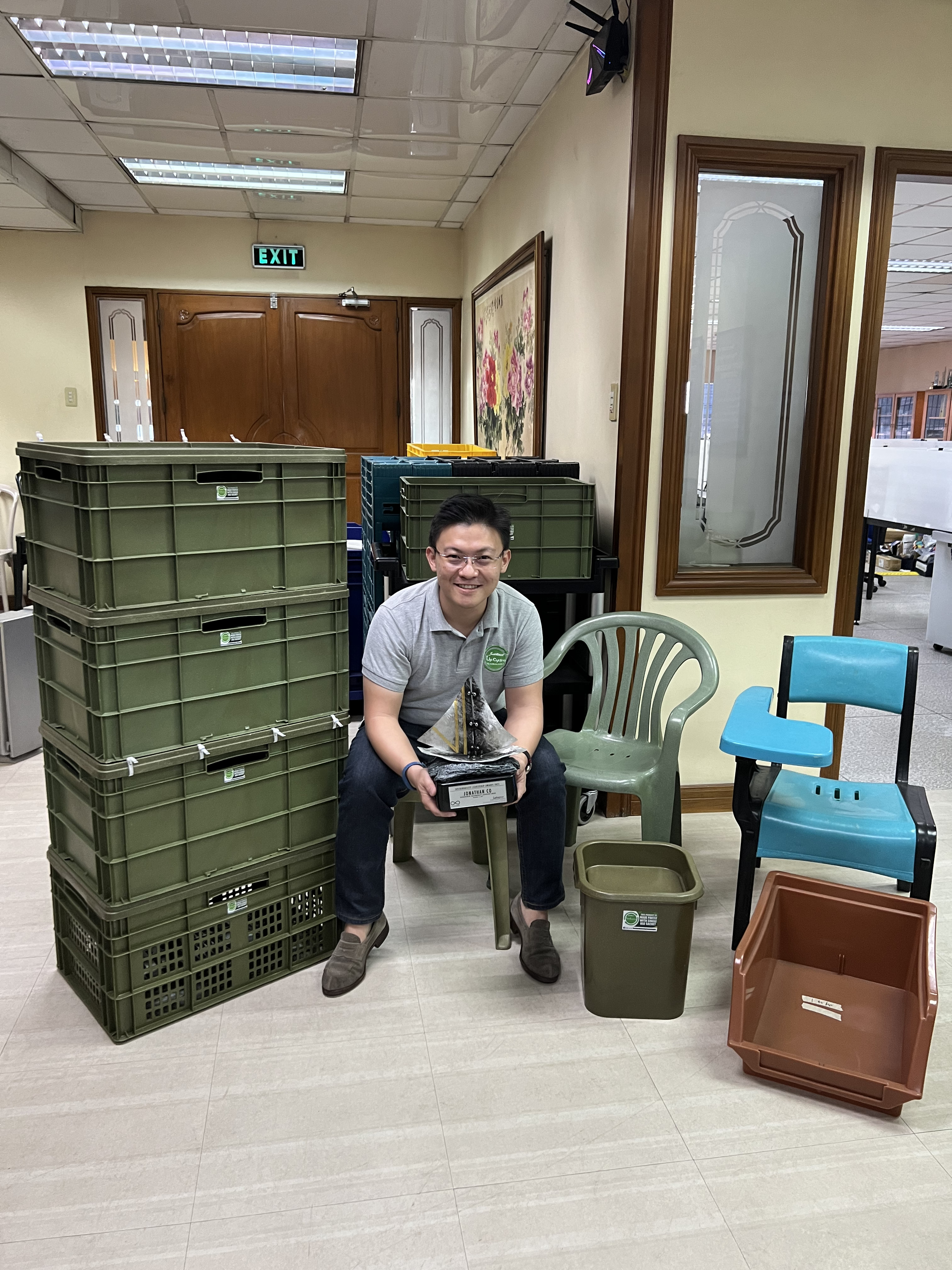

Busan, 25 November–1 December 2024: The ERIA delegation, led by Mr Reo Kawamura, Director for ERIA’s Regional Knowledge Centre for Marine Plastic Debris, took part in various critical activities in the fifth session of the Intergovernmental Negotiating Committee (INC-5). This session aimed to develop an international legally binding instrument on plastic pollution, including marine pollution.
As an accredited Intergovernmental Organization (IGO) of the United Nations Environment Assembly (UNEA), ERIA submitted a written statement to the Opening Plenary of the INC-5 on 25 November 2024. The statement underscored significant progress in addressing plastic pollution within the ASEAN region, citing key achievements such as the adoption of the ASEAN Declaration on Plastic Circularity during the 44th and 45th ASEAN Summits in October 2024 and the successful outcomes of the ASEAN Conference on Combatting Plastic Pollution (ACCPP) 2024. Drawing from its role in supporting these milestones and ASEAN’s collaborative approach to consensus-building, ERIA urged the delegates attending the INC-5 to reach a reasonable consensus on an international legally binding instrument on plastic pollution.
On 26 November 2024, Mr Kawamura delivered his presentation at a roundtable titled ‘Uniting for a Plastic-Free Future: Policy Approaches and Global Collaboration,’ organised by the Korean Environment Institute (KEI). This unofficial side event of the INC-5 gathered over 50 participants, including experts from the private sector, academia, research institutions, and international organisations from all over the world. They discussed issues related to the plastic treaty and necessary policies, such as sustainable plastic design, extended producer responsibilities (EPR), plastic circularity, and international cooperation.
Mr Kawamura started his presentation by introducing the OECD’s projection in 2023 on global plastic leakage into the environment, and a research article to show that seven ASEAN+3 Member States are amongst the top 10 countries with the highest annual plastic emissions into the ocean. He also summarised the regional and national actions taken by ASEAN member states to combat plastic pollution, highlighting the newly adopted ASEAN Declaration on Plastic Circularity and the outcomes of ACCPP 2024. As he pointed out the performance gaps of data collection and waste management in ASEAN, he emphasised the importance of building knowledge and capacity to fill the gaps, and the need for international schemes to provide not only principles and guidelines but also practical support to the region.
On 27 November 2024, Mr Kawamura delivered his presentation at another unofficial side event called ‘Enhanced Readiness of The Southeast Asian Region in Addressing Plastic Pollution under Plastic Treaty: Regional Collaboration to Address Plastic Pollution Across Its Lifecycle,’ co-organised by the Indonesia National Plastic Action Partnership (NPAP), World Resources Institute Indonesia, Global Plastic Action Partnership, University of New South Wales, Global Ocean Account Partnership, and ERIA, in collaboration with Coca-Cola Europacific Partners and Sirsak.co. Dozens of participants discussed the establishment of a dataset for plastic waste management, the role of industries to support plastic pollution countermeasures, and support for ASEAN Member States in the areas of finance, capacity building, and technology.
Mr Kawamura set the context of the session. He summarised the status quo and outlook of plastic pollution and highlighted the progress of plastic pollution countermeasures in ASEAN member states and ASEAN as a region. He outlined the priority topics amongst ASEAN Member States in the draft text circulated in the INC-3 and INC-4. Pointing out that waste management, product design, and existing plastic pollution are the most relevant topics for ASEAN Member States, Mr Kawamura stressed the importance of international support to bridge gaps in knowledge and capacity. Such international schemes should offer not just principles but also actionable, practical assistance to ASEAN nations.
Busan, 25 November–1 December 2024: The ERIA delegation, led by Mr Reo Kawamura, Director for ERIA’s Regional Knowledge Centre for Marine Plastic Debris, took part in various critical activities in the fifth session of the Intergovernmental Negotiating Committee (INC-5). This session aimed to develop an international legally binding instrument on plastic pollution, including marine pollution.
As an accredited Intergovernmental Organization (IGO) of the United Nations Environment Assembly (UNEA), ERIA submitted a written statement to the Opening Plenary of the INC-5 on 25 November 2024. The statement underscored significant progress in addressing plastic pollution within the ASEAN region, citing key achievements such as the adoption of the ASEAN Declaration on Plastic Circularity during the 44th and 45th ASEAN Summits in October 2024 and the successful outcomes of the ASEAN Conference on Combatting Plastic Pollution (ACCPP) 2024. Drawing from its role in supporting these milestones and ASEAN’s collaborative approach to consensus-building, ERIA urged the delegates attending the INC-5 to reach a reasonable consensus on an international legally binding instrument on plastic pollution.
On 26 November 2024, Mr Kawamura delivered his presentation at a roundtable titled ‘Uniting for a Plastic-Free Future: Policy Approaches and Global Collaboration,’ organised by the Korean Environment Institute (KEI). This unofficial side event of the INC-5 gathered over 50 participants, including experts from the private sector, academia, research institutions, and international organisations from all over the world. They discussed issues related to the plastic treaty and necessary policies, such as sustainable plastic design, extended producer responsibilities (EPR), plastic circularity, and international cooperation.
Mr Kawamura started his presentation by introducing the OECD’s projection in 2023 on global plastic leakage into the environment, and a research article to show that seven ASEAN+3 Member States are amongst the top 10 countries with the highest annual plastic emissions into the ocean. He also summarised the regional and national actions taken by ASEAN member states to combat plastic pollution, highlighting the newly adopted ASEAN Declaration on Plastic Circularity and the outcomes of ACCPP 2024. As he pointed out the performance gaps of data collection and waste management in ASEAN, he emphasised the importance of building knowledge and capacity to fill the gaps, and the need for international schemes to provide not only principles and guidelines but also practical support to the region.
On 27 November 2024, Mr Kawamura delivered his presentation at another unofficial side event called ‘Enhanced Readiness of The Southeast Asian Region in Addressing Plastic Pollution under Plastic Treaty: Regional Collaboration to Address Plastic Pollution Across Its Lifecycle,’ co-organised by the Indonesia National Plastic Action Partnership (NPAP), World Resources Institute Indonesia, Global Plastic Action Partnership, University of New South Wales, Global Ocean Account Partnership, and ERIA, in collaboration with Coca-Cola Europacific Partners and Sirsak.co. Dozens of participants discussed the establishment of a dataset for plastic waste management, the role of industries to support plastic pollution countermeasures, and support for ASEAN Member States in the areas of finance, capacity building, and technology.
Mr Kawamura set the context of the session. He summarised the status quo and outlook of plastic pollution and highlighted the progress of plastic pollution countermeasures in ASEAN member states and ASEAN as a region. He outlined the priority topics amongst ASEAN Member States in the draft text circulated in the INC-3 and INC-4. Pointing out that waste management, product design, and existing plastic pollution are the most relevant topics for ASEAN Member States, Mr Kawamura stressed the importance of international support to bridge gaps in knowledge and capacity. Such international schemes should offer not just principles but also actionable, practical assistance to ASEAN nations.

Director of the Knowledge Centre


